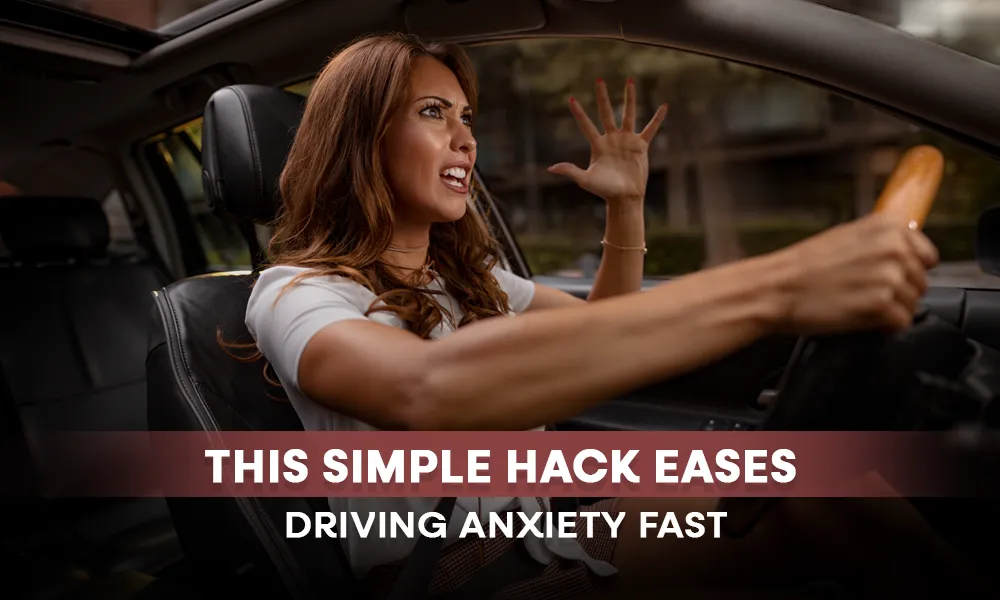Let’s be honest—driving can be stressful, particularly if you’re a new driver and have just gotten your license or are planning to take the test soon. Essentially, people are different, and the road conditions that stress them out differ. While for some it can be driving on the highway, for others it could be driving at night, driving in bumper-to-bumper traffic with unpredictable drivers, or the sheer pressure of navigating unfamiliar roads. For me, it is driving in bumper-to-bumper traffic. I’m always worried I’ll crash into the car ahead, and the driver behind me honking at the slightest delay does not help matters!
Over the years, I’ve realized that anxiety behind the wheel is more common than most people like to admit. Even the ones who claim to be experts at driving often face anxious moments on the road, but can get over them quickly. What I’m trying to say is that if you’re someone who feels your heart rate spike the moment you slide into the driver’s seat, you’re not alone. And even if you do get anxious, you should be able to calm yourself down and continue with your journey. You’ll find a host of techniques to deal with anxiety online, but this simple trick is what helps me calm down almost instantly. It’s not complicated nor expensive, so trying it out won’t hurt.
Top Hack To Decrease Driving Anxiety

Talk to yourself—out loud!
Yes, it’s as simple as that. At least it is for me. This is essentially an in-the-moment grounding technique that helps me focus on what’s happening right now rather than worrying about what could go wrong later.
Why This Works
When anxiety creeps in, your brain tends to become extra creative, inventing one worst-case scenario after another. Questions like, “What if I miss the exit?”, “What if someone cuts me off?”, “What if I panic in the middle of the highway?”, “What if my car stalls in the middle of traffic?”, and so on, tend to paint vivid pictures of all the things that could go wrong, when in fact the actual situation may not be as complicated.
Speaking out loud helps interrupt your brain’s thought process and forces it to focus on the present. By talking out loud, you are forcing your brain to shift from reactive mode to narrative mode—putting the part of your mind that processes language, logic, and structure to work.
You could try telling yourself things like:
- “I’m in control of this car.”
- “I’ve driven this route before and I know what to expect.”
- “Even if I miss a turn, I can reroute. No big deal.”
- “I’m doing just fine.”
- “I’m not going to bump into the car in front.”
You may think this is silly, but verbally reassuring yourself can help to calm you down and get over the anxious moment. It’s much like having a calm, confident co-passenger, telling you you’re doing OK—except that your co-passenger is you.
Taking It Up a Notch
Alternatively, if you’d rather not give yourself a pep talk, you could keep your focus sharp by narrating your actions and the next steps you’re going to take. This would involve telling yourself things like:
- “I’m checking my mirrors.”
- “I’m slowing down for the light.”
- “I’m merging into the left lane.”
Doing this helps you keep your focus on the present moment and gives your brain a task to do—one that’s productive and calming. This is especially helpful during long drives or in high-stress traffic zones.
A Word Of Caution
If you feel your anxiety has made you incapable of driving, it is advisable to pull over as soon as possible and only begin driving once you have calmed down completely. Give yourself a few minutes to get back in control and banish the crazy thoughts from your mind. Once you are sure you have calmed down, you can start driving again.
Final word
If you’re anxious when you drive, it doesn’t mean you are a bad driver. Anxiety is your brain’s way of trying to protect you. Remember, anxious drivers tend to drive more carefully on the road than the confident and overconfident ones. Anxiety can be overpowering when driving, but the key isn’t to fight anxiety, but to redirect it. This simple hack of talking to myself helps redirect my brain’s energies from spinning out one worst-case scenario after another to focusing on assessing what is happening in the moment.
So next time you feel that familiar tension creeping in, talk yourself through the situation. You might be surprised how quickly your confidence returns.







